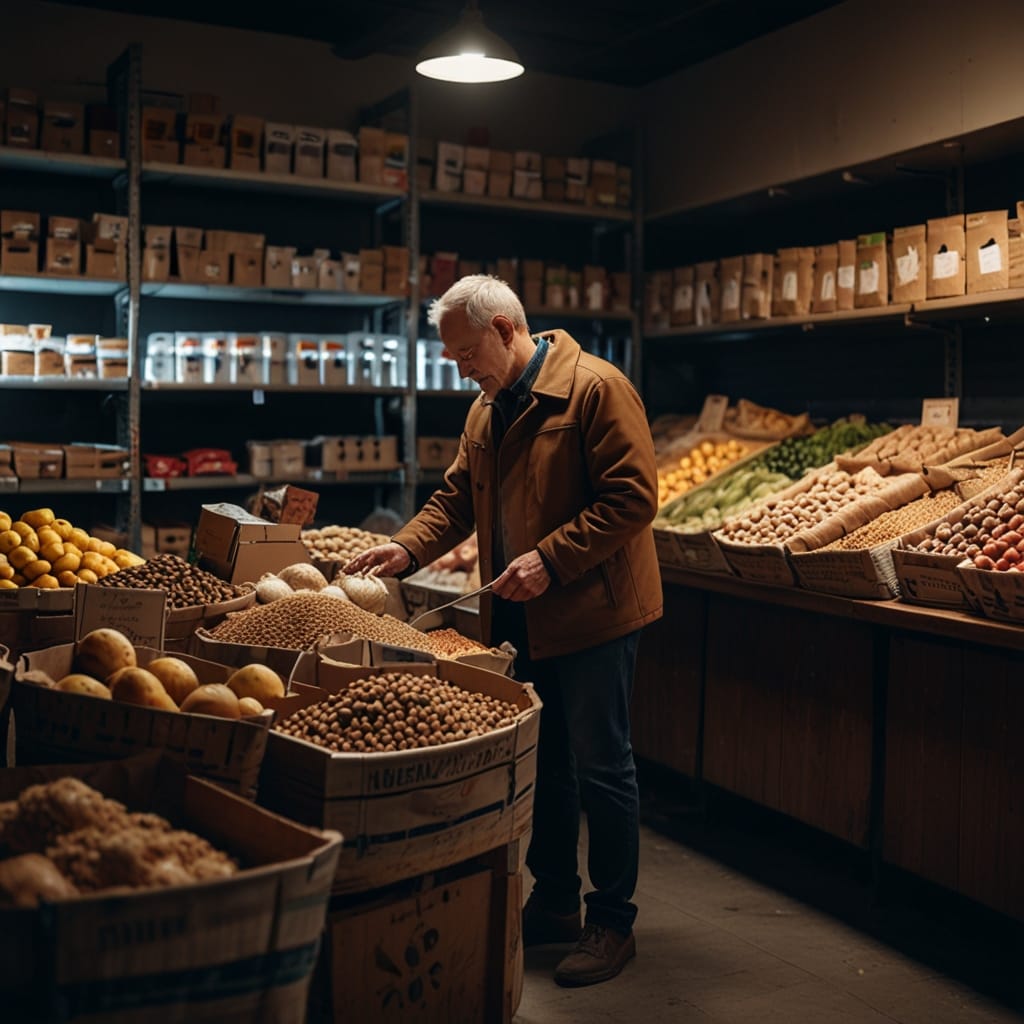Simple Steps to Reduce Your Waste
According to data from the EPA, the average American generates about 4.9 pounds of waste daily. Reducing waste might seem daunting, but it doesn’t have to be. Even if you can’t do it perfectly, every effort counts!
From adopting sustainable practices to choosing eco-friendly products, there are numerous ways, big and small, to reduce your waste in a way that fits your lifestyle. To help you get started, we’re sharing 21 easy zero-waste tips. No pressure or judgment—just try a few and see what works for you!
Remember, perfection isn’t the goal. The world needs millions of people making imperfect efforts towards zero-waste living, not just a few doing it flawlessly.
20 Creative Ways to Minimize Waste at Home: Reduce, Reuse, Recycle

(Bulk Goods: The Ultimate Eco-Friendly Choice) Discover the ultimate eco-friendly products with bulk goods. Buying in bulk reduces packaging waste and lowers your carbon footprint by minimizing transportation needs. Opt for staples like grains, nuts, and spices in bulk to cut down on single-use containers and save money. Bulk goods rank high in sustainability and zero-waste practices, making them a smart choice for a greener lifestyle. Embrace this eco-friendly approach to simplify your shopping, reduce waste, and contribute to a more sustainable future.

(Say No to Plastic Bottles) Say no to plastic bottles and switch to reusable alternatives to reduce environmental impact. Plastic bottles contribute to pollution and waste, but reusable water bottles and stainless steel options help cut down on single-use plastics. Embracing this eco-friendly choice ranks high in sustainability and waste reduction, promoting a cleaner planet and saving money in the long run. By choosing reusable bottles, you support a greener lifestyle and minimize your carbon footprint.

(Invest in Cloth Produce Bags) Invest in cloth produce bags to cut down on plastic waste and support a sustainable lifestyle. These reusable bags are perfect for fruits and vegetables, reducing your reliance on single-use plastic bags. Cloth produce bags rank high in eco-friendly and waste-reduction practices, offering durability and convenience. By choosing cloth over plastic, you help protect the environment and promote a greener way of shopping. Make the switch today and enjoy a more sustainable approach to grocery shopping.

(Choose Produce Without Plastic Packaging) Choose produce without plastic packaging to reduce waste and support sustainable practices. Opting for fruits and vegetables sold loose or in minimal packaging helps cut down on single-use plastics and minimizes your environmental impact. This eco-friendly choice ranks high in sustainability and waste reduction, contributing to a cleaner planet. By selecting unpackaged produce, you also often find fresher options and support better environmental practices in your grocery shopping. Make the switch to plastic-free produce and embrace a greener lifestyle.

(Support Your Local Farmers) Support your local farmers to enjoy fresher, tastier produce while boosting your community’s economy. Buying directly from local farms reduces food miles, minimizes environmental impact, and often provides higher-quality, seasonal fruits and vegetables. This eco-friendly choice ranks high in sustainability and local support, helping to build a more resilient food system. By choosing local, you not only contribute to a healthier planet but also gain access to unique and delicious options while fostering community connections.

(Eliminate Single-Use Plastics) Eliminate single-use plastics to reduce waste and protect the environment. Opt for reusable alternatives like cloth bags, metal straws, and glass containers to cut down on plastic pollution. This eco-friendly choice ranks high in sustainability and waste reduction, helping to conserve resources and lower your carbon footprint. By making small changes, you contribute to a cleaner planet and promote a greener lifestyle. Embrace these sustainable habits to minimize your impact and support a more eco-conscious future.

(Skip the Tea Bags) Skip the tea bags and switch to loose-leaf tea for a more sustainable and flavorful brew. Tea bags often contain microplastics, while loose-leaf tea comes with minimal packaging and offers richer, fresher flavors. Using a reusable infuser or strainer ranks high in eco-friendly practices and waste reduction. This simple change helps reduce plastic waste and supports a greener lifestyle. Enjoy a more satisfying cup of tea and make a positive impact on the environment by opting for loose-leaf over tea bags.

(Eco-Friendly Wardrobe Tips) Embrace eco-friendly wardrobe tips to build a sustainable and stylish closet. Opt for high-quality, timeless pieces that last longer and reduce waste. Choose clothing from sustainable brands or shop secondhand to minimize your environmental impact. Repurpose or upcycle old garments to extend their life and cut down on landfill contributions. Prioritize natural, organic fabrics over synthetic ones to support eco-friendly practices. These top-ranking tips in sustainability and fashion will help you create a greener wardrobe while looking fabulous.

(Meal Planning for Zero Waste) Meal planning for zero waste helps minimize food waste and reduce your environmental footprint. By planning your meals, you can buy only what you need, use up leftovers, and avoid impulse purchases. Focus on incorporating versatile ingredients and making full use of every part of your produce. This eco-friendly practice ranks high in waste reduction and sustainability, supporting a greener lifestyle. With thoughtful meal planning, you’ll save money, cut down on waste, and contribute to a more sustainable food system.

(Embrace Vegetarian Meals) Embrace vegetarian meals to boost your health and support a more sustainable lifestyle. Plant-based diets often include nutrient-rich foods like vegetables, legumes, and grains, which are lower in calories and better for the environment. Reducing meat consumption helps lower your carbon footprint and decreases the demand for resource-intensive animal farming. Incorporating vegetarian meals ranks high in eco-friendly and health-conscious choices, making it easier to contribute to a greener planet while enjoying delicious and satisfying dishes. Explore new recipes and embrace the benefits of a plant-based diet today.

(Compost Food Scraps) Compost food scraps to reduce waste and enrich your garden. By composting vegetable peels, coffee grounds, and eggshells, you divert organic matter from landfills and create nutrient-rich soil for your plants. This eco-friendly practice ranks high in sustainability and waste reduction, supporting a greener lifestyle. Composting not only minimizes your environmental impact but also helps you recycle kitchen waste into valuable resources for your garden. Start composting today and contribute to a cleaner planet while boosting your garden’s health.

(Replace Plastic Wrap with Beeswax Wrap) Replace plastic wrap with beeswax wrap to reduce waste and embrace a more sustainable kitchen. Beeswax wraps are reusable, biodegradable, and perfect for covering food or wrapping snacks. They come in various sizes and patterns, making them a stylish and eco-friendly alternative to single-use plastics. By choosing beeswax wraps, you lower your environmental impact and support zero-waste practices. This simple switch ranks high in sustainability and eco-conscious living, helping you contribute to a greener planet while keeping your food fresh.

(Eco-Friendly Menstrual Products) Switch to eco-friendly menstrual products to reduce waste and support a sustainable lifestyle. Options like menstrual cups, cloth pads, and period underwear are reusable and environmentally friendly, offering a healthier alternative to disposable products. These choices help minimize landfill waste and cut down on single-use plastics. Eco-friendly menstrual products rank high in sustainability and cost-efficiency, providing long-term savings and a greener approach to personal care. Make the switch today to embrace a more eco-conscious period routine and contribute to a cleaner planet.

(Embrace Imperfect Produce) Embrace imperfect produce to reduce food waste and save money. Often discounted and just as nutritious as perfect fruits and vegetables, these items can be just as delicious. By choosing imperfect produce, you help combat food waste and support a more sustainable food system. Plus, you’ll find a variety of unique and budget-friendly options. So next time you shop, look for those “imperfect” fruits and veggies—they’re often ranked as eco-friendly and economical choices.

(Repurpose Old Clothes) Repurpose old clothes to give them new life and reduce waste. Turn worn-out garments into DIY projects like rags, tote bags, or even new fashion pieces. This eco-friendly practice helps minimize landfill contributions and supports a sustainable lifestyle. By creatively reusing your clothing, you not only save money but also embrace a unique, personalized style. Repurposing old clothes ranks high in eco-conscious living and budget-friendly practices, making it a win-win for both your wardrobe and the environment.

(Switch to Bar Soaps) Switch to bar soaps to cut down on plastic waste and enjoy a more sustainable option for your skincare routine. Bar soaps often come with minimal or no packaging, reducing your environmental impact. They’re also typically more concentrated, so you get more use out of each bar compared to liquid soaps. Embracing bar soaps ranks high in eco-friendly and zero-waste practices, making it a simple yet effective way to contribute to a greener planet while maintaining your personal care routine.

(DIY Cleaning Products) Switching to DIY cleaning products is an excellent way to reduce your environmental footprint and save money. By using simple ingredients like vinegar, baking soda, and lemon juice, you can create effective and eco-friendly cleaners for your home. DIY cleaning solutions are free from harsh chemicals, making them a healthier choice for both your family and the environment. Embracing DIY cleaning products ranks high in sustainability and cost-efficiency, offering a practical approach to maintaining a clean home while supporting a greener lifestyle.

(Maintain Your Car’s Air Filter) Maintaining your car’s air filter is crucial for optimal performance and fuel efficiency. Regularly checking and replacing the air filter ensures your engine runs smoothly and reduces emissions, making it an eco-friendly choice. A clean air filter improves air quality inside your vehicle and prolongs engine life. Prioritizing air filter maintenance ranks high in vehicle care and environmental sustainability, helping you drive a cleaner, more efficient car while supporting a greener lifestyle.

(Recycle Spare Tires) Recycle spare tires to reduce waste and support sustainable practices. Instead of letting old tires pile up, take them to a recycling facility where they can be repurposed into useful products like playground surfaces, road materials, or even new tires. Recycling tires ranks high in eco-friendly initiatives and waste management, helping to minimize environmental impact while giving old tires a second life. By choosing tire recycling, you contribute to a cleaner, more sustainable planet.

(Go Digital, Reduce Paper Waste) Go digital to significantly reduce paper waste and embrace a more sustainable lifestyle. By opting for electronic documents, e-books, and online billing, you cut down on paper consumption and minimize your environmental impact. Digital solutions rank high in eco-friendly and waste-reduction practices, helping to conserve resources and reduce clutter. Making the switch to digital not only supports a greener planet but also offers convenience and efficiency in managing your documents and information.
There you have it! We’re not suggesting you do everything on this list—Rome wasn’t built in a day. With a little time and patience, you can significantly reduce your impact. We hope you feel inspired to create less waste and adopt a more sustainable lifestyle.

I really enjoyed this comprehensive list of practical tips for starting a zero-waste lifestyle! It’s so refreshing to see advice that feels accessible and not overwhelming, especially for those of us just beginning the journey. The emphasis on using what you already have before buying new things really resonated with me — it’s such a simple yet impactful mindset shift.
I’m curious, which of these tips made the biggest difference for you personally? Sometimes it’s hard to know where to focus first, so hearing what worked best for others is always helpful. Thanks for the inspiration and motivation to make more eco-friendly choices!